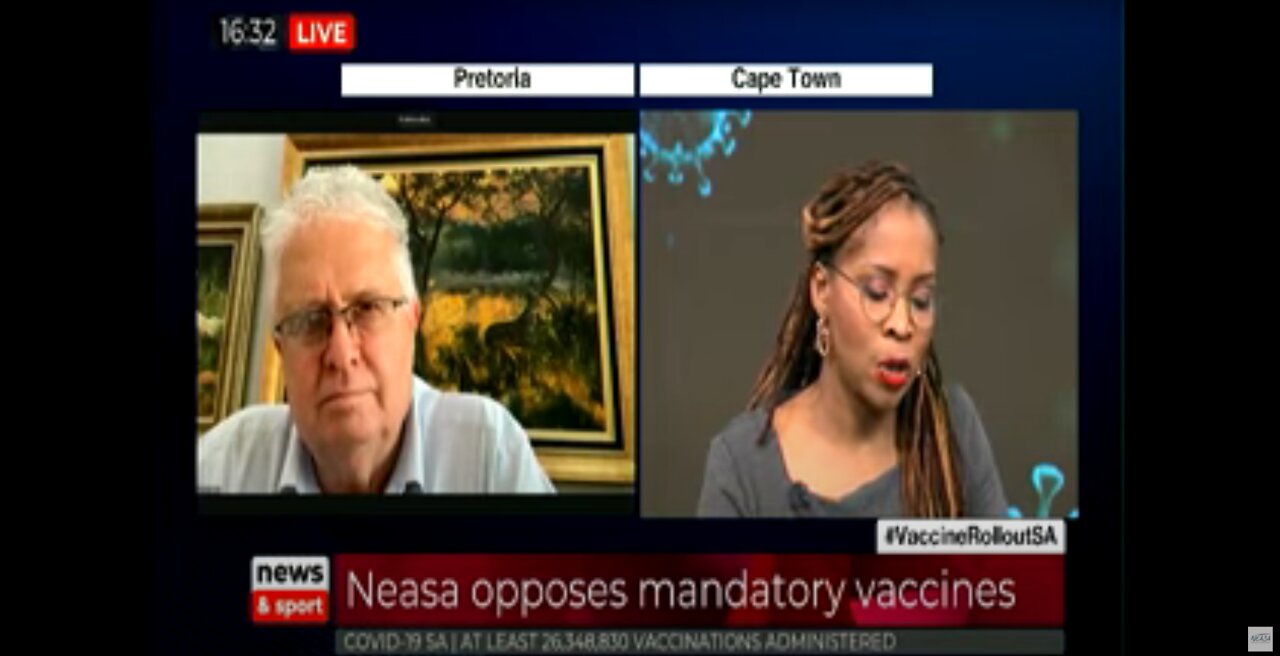Premium Only Content

Businesses oppose mandatory vaccinations
Gerhard Papenfus, CE of the National Employers' Association of South Africa, was interviewed on Etv News and Sport , 6 December 2021. #vaccinemandates #mandatoryvaccinations
The employer has an almost insurmountable mountain to climb should it wish to introduce a policy of mandatory vaccinations in the workplace.
The overwhelming regulatory requirements are seemingly disregarded by some employers (following the example of various corporates) announcing that they will simply be enforcing mandatory vaccinations on all their employees.
Before dealing with the obstacles which an employer needs to overcome, it is necessary to, once again, state NEASA’s position regarding this very contentious issue:
1. NEASA is unequivocally opposed to any policy aimed at forcing an employee to be subjected to mandatory vaccination, against his or her will;
2. NEASA’s position in this regard is based on:
the constitutional right to bodily integrity and freedom of religion, opinion and belief;
moral, ethical and legal grounds; and
fundamentally, the individual’s uncompromised right of freedom of choice.
More on NEASA’s view here:
Mandatory Covid-19 Vaccinations in the Workplace: Compensation for injuries, illness or Death;
Mandatory Vaccinations in the Workplace: Freedom of Choice;
Mandatory Vaccinations in the Workplace: Directive does not envisage a blanket approach
NEASA does not support Infringing Mandatory Vaccinations
WATCH: “Stand up to bullies” – In Response To The Current Global Health Predicament
The directions issued by the Department of Employment and Labour (DEL), which seemingly permit the implementation of mandatory vaccinations in the workplace, as well as the notice by the Compensation Fund Commissioner (‘the notice’), regarding compensation for employees who suffer injury, illness or death as a result of receiving a mandatory vaccine, impose stringent regulatory requirements on employers.
As it currently stands, the implementation of a mandatory vaccine policy in a workplace may well be an unjustifiable infringement of the constitutional rights to bodily integrity and freedom of religion, opinion and belief.
So where does this leave an employer?
The abovementioned issues require an employer, contemplating the implementation of a mandatory vaccination policy, to answer a number of questions it may be faced with and which, if not answered satisfactorily, may well expose the employer to a number of claims by employees.
The first question an employer should be asking may not be a legal one, as it deals with the morality of imposing a vaccine on a person against their will. It is clear from the directions from DEL, as well as the notice, that an employer may not force an employee to receive a vaccine against their will. However, the fact that an employee is forced to elect between receiving a vaccine or potentially being dismissed, effectively constitutes the enforcement of a vaccine.
Each employer should therefore answer the question as to whether it believes that it is necessary, required and morally justifiable to interfere with the freedom of choice of an individual by imposing a mandatory vaccination policy?
The second question an employer should ask is whether it has complied with the requirements of the direction for the implementation of a mandatory vaccination policy.
This question has to be answered within the broader context of the original Consolidated Direction on Occupational Health and Safety Measures in Certain Workplaces, as the introduction of mandatory vaccination policies is simply an amplification of these directions, as well as the requirements of the Labour Relations Act, Employment Equity Act and the notice.
-
 LIVE
LIVE
SpartakusLIVE
5 hours agoNONSTOP Snipes, Rockets, and BICEPS = Monday MOTIVATION
490 watching -
 DVR
DVR
Rallied
7 hours ago $0.39 earnedSolo Challenges All Day
42.4K2 -
 1:27:53
1:27:53
Flyover Conservatives
9 hours agoIs AI Actually Alien Intelligence? Dr. Jason Dean Exposes the Dark Side | FOC Show
21.9K -
 1:47:36
1:47:36
Glenn Greenwald
6 hours agoJD Vance and Rand Paul Clash on Due Process: War on Terror Echoes; Has the U.S. Given Up on Confronting China? Ben Shapiro's Latest Falsehoods About Israel | SYSTEM UPDATE #510
93.2K67 -
 LIVE
LIVE
RaikenNight
3 hours ago $0.39 earnedExploring the Galaxy of No Mans Sky
174 watching -
 LIVE
LIVE
Spartan
5 hours agoRanked and Expedition 33 (NG+4 and all enemies Set to 10x health)
80 watching -
 2:54:31
2:54:31
Jokeuhl Gaming and Chat
8 hours agoDARKTIDE - Warhammer 40k w/ Nubes and AoA
11.9K1 -
 2:19:56
2:19:56
Nerdrotic
15 hours ago $1.07 earnedNerdrotic Nooner 513
46.2K2 -

BigTallRedneck
4 hours agoRANKED FINALS W OMEGA
16K1 -
 LIVE
LIVE
Eternal_Spartan
12 hours ago🟢 Eternal Spartan Plays Final Fantasy 7 Rebirth Ep. 3 | USMC Vet | Join the Best Chat on Rumble
68 watching